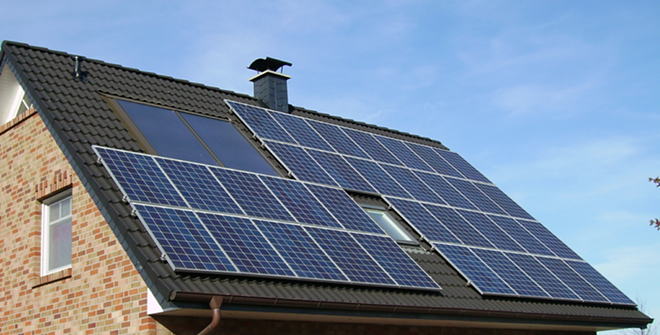It’s hard to imagine stalwart Tea Party activists and equally passionate environmentalists sharing a stage at a political rally, calling for the same reforms, but there they were.
It was two days before Halloween, 2014. Activists were holding a “pitchfork” rally in St. Pete’s Williams Park, directly across from Duke Energy’s local headquarters. The audience waved pitchforks — some designed to bail hay, some to accessorize a sexy devil costume — to decry a laundry list of grievances against the energy giant, including bad-faith billing practices and and a lackluster approach to renewable energy, namely solar.
“They used to tell us when we started the fight that only liberals like solar,” said Debbie Dooley of Conservatives for Energy Freedom at the event. “That’s a lie. I’m one of 22 founding members of the national Tea Party movement and I love solar.”
For Dooley and other conservatives who support expanded solar options, it’s less about curbing carbon emissions, as environmentalists desire, than it is about embracing free market principles and quashing monopolies.
Months later, in January of 2015, Dooley’s group, along with environmental nonprofit Southern Alliance for Clean Energy (SACE) and a diverse array of supporters, launched the Floridians for Solar Choice initiative. It’s an effort to get an amendment favoring solar power on Florida’s ballot in 2016. In brief, the amendment would make it legal for solar companies to install rooftop panels on homes and businesses at little or no cost to a given property owner, and sell the power that’s generated (up to two megawatts per installation) back to said home or business, something that’s currently illegal.
The model that is legal now allows anyone who can afford to purchase or lease panels from a solar installer to do so, then sell the excess power the panels generate back to the area’s major electricity utility. Clean energy advocates lament the limitations of that model, given how — despite a recent drop in solar equipment prices — out-of-reach solar panels are to many homeowners.

Depending on the metrics used, various solar industry rankings of solar-friendly states put Florida between sixth and 24th in the nation when it comes to generating solar, despite the state being third-highest in the country in terms of solar potential. So an amendment making solar more accessible seems like a no-brainer.
“We’re missing out… we’re talking about tens of thousands of jobs and billions in economic development,” SACE Executive Director Steven Smith said at a recent Florida Association of Counties event at the Hilton St. Petersburg Bayfront.
Solar energy backers are pursuing change by way of the ballot, Smith said, because state lawmakers have ignored their requests to take it up by way of legislation.
Right now, the state supreme court is considering the proposal’s ballot language, and backers of the cause are seeking more than 600,000 petition signatures to get it onto the ballot if the court approves — but neither of those is the amendment’s biggest hurdle.
Enter Consumers for Smart Solar, an amendment effort that, if adopted, would change nothing, instead embedding what’s already on the books — essentially a ban on third-party power generators — into the state constitution. Backers of that effort, launched this past spring, have admitted its intent is largely aimed at derailing Floridians for Solar Choice.
(Note: From here on out we’ll shorten the two to “Solar Choice” and “Smart Solar”.)
Smart Solar’s backers, funded largely by utilities as well as conservative-leaning groups (some purporting to be pro-environment), are aggressively attacking Solar Choice in an attempt to cast it as a “shady” giveaway to to unscrupulous out-of-state solar companies hellbent on wreaking havoc on consumers.
“Should this Shady Solar Amendment make it onto the November 2016 ballot, a yes vote would allow out-of-state solar companies to scam Florida consumers,” said Sarah Bascom of Bascom LLC, the firm hired to handle Smart Solar’s public relations, in a written statement. “Beware of this ‘sweetheart deal’ that Floridians for Solar Choice is trying to sell you — this is nothing more than a special interest goody bag for giant out-of-state solar utilities.”
Smart Solar supporters have a long list of concerns about Solar Choice’s potential impact on consumers, concerns they’ve been disseminating through graphic-heavy web ads offering versions of the two proposals simplified to support their perspective.
“If it were to pass, it would force Floridians to give up some of their basic consumer rights as a means to advance one segment of one industry, essentially allowing corporations to conduct solar sales outside of the law by blocking any consumer protections that could possibly inhibit their financial interests,” said Alys Daly, a spokeswoman for Florida Power and Light, South Florida’s major electric utility. “This would be unprecedented, not just in Florida, but anywhere.”
Daly is referring to language in the ballot amendment that bars local and state governments from enforcing certain types of regulation. The measure aims to limit or prevent specific barriers to non-utility solar providers that are currently in place, including government and power company control of “rates, service and territory, and unfavorable electric utility rates, charges, or terms of service imposed on local solar electricity customers.”
Hannah Wiseman, an energy law professor at Florida State University, said the amendment hardly creates a consumer-be-damned free-for-all for solar companies, but if it should pass, the state should obviously keep an eye out for cases of fraud.
“There are concerns that with one individual contracting with any third-party company, be it a rooftop solar company or anything else, occasionally fraud can arise, and that’s what state consumer protection laws are for,” she said. “I don’t view this amendment as impeding consumer protection laws.”
If someone is misinformed by a contract or something was misrepresented, Wiseman said, “there will be mechanisms, just like there are mechanisms for every other type of consumer concern, for consumers to go to the state with their concern.”
Smart Solar proponents say the amendment would be an affront to consumer rights because solar companies can bamboozle home or business owners into paying exorbitant rates for solar power. But Susan Glickman, also of SACE, compares the transaction that would occur between third-party solar outfits and consumers to that of a cell phone contract. Customers can shop around for deals and sign a contract that would lock in low rates. If a property owner wants to sell before the contract is up, he or she can sell the agreement with the house just as one does with a home alarm system.
“No homeowner is going to be forced into a contract, and they can shop around for better contracts,” Wiseman said. “If
the consumer does a good job bargaining with these competitive companies, the consumer can lock in a favorable low rate for electricity.”
The first solar initiative is outpacing the second in terms of fundraising; $750,965.95 for Solar Choice to $463,045 for Smart Solar.
Solar Choice’s list of campaign contributors dwarfs that of the Smart Solar effort by some 200 to 24. Donations to the former tend to be smaller, though it should be noted that more than $500,000 of Solar Choice’s nearly $751,000 comes from SACE entities. A major independent donor is Coral Gables resident Barbara Stiefel, heir to the Stiefel Laboratories fortune, who has given generously to progressive causes over the years, including $50,000 to Solar Choice.
Conservatives for Energy Freedom was another major donor ($15,000). Solar companies that have donated include U.S. Solar ($1,000) and Solar Energy Management ($1,500).
But thousands in solar industry contributions don’t mean solar energy companies are some kind of political juggernaut in Florida, and are probably far from it — especially compared to utilities.
“In my estimation, the solar power industry has not been particularly strong as far as interest groups go,” said University of Central Florida Political Science Professor Aubrey Jewett. “They’re not nearly as well-funded, well-established as the basic utility companies.”
The face of the Smart Solar effort is the Smart Solar PAC’s co-chair, former Orlando-area State Representative-turned-lobbyist Dick Batchelor, a Democrat many consider a progressive.
Jewett, who considers himself a moderate and is undecided on the solar measure, saw Batchelor’s siding with Smart Solar as a potential sign of the effort’s validity, though for him the major utilities’ involvement in the effort raises a red flag.
“My political science radar, after 20 years of studying politics, particularly Florida politics, I just assume if big industries get involved in anything, that they’re looking out for their own bottom line, not necessarily looking out for what’s best for the average Floridian,” he said. “Occasionally that’s wrong, but nine times out of ten that turns out to be the case.”
SACE’s Glickman says the Smart Solar effort isn’t so much about getting on the ballot as it is confusing voters, and “would be laughable if it wasn’t so scary.”
“They’re just doing it to make it harder to gather signatures,” she said. “They are paying twice the going rate for petition gatherers and asking people to sign a noncompete...If there’s a cynical way to thwart the Solar Choice initiative that is so popular, they will do that and the utilities have all the money in the world to fund an operation like that and they’ve done it.”
Bascom affirmed the noncompete agreements and the higher pay for canvassers, but said in an email the campaign did so because it started so late in the game and needed to catch up to the tens of thousands the competition has collected
since January.
But Glickman’s not buying it. She points to the tens of thousands donated to Smart Solar by power companies including Florida Power & Light, Duke and Gulf Power (each have directly given $30,000 so far) as well as a number of entities including “Partnership for Affordable Clean Energy,” a group that clearly opposes clean energy initiatives and regulations despite the name. It gave $25,000. Similarly, groups called the Energy and Social Justice Project and the Energy Equity Alliance, which gave $15,000 and $1,000, respectively, both have ties to utilities.
And while Smart Solar’s supporters say support from groups like National Black Chamber of Commerce and Florida Hispanic Chamber of Commerce, which each gave $50,000, suggest the amendment has minority and low-income Floridians’ best interests at heart, investigations into utility and fossil fuel industry ties to both groups suggest otherwise. For example, the Florida Center for Investigative Reporting found Exxon-Mobile made $1 million in contributions to the National Black Chamber between 2002 and 2014, and Gulf Power and Koch Industries-owned Georgia Pacific also donated to the organization. A complete list of contributors wasn’t available.
“The National Black Chamber of Commerce should take a firm stand against the misinformation being spread by these industries,” U.S. Rep. Alcee Hastings, a Fort Lauderdale Democrat, said in an August media release responding to the group’s position. “I believe that we should all be on the side of families, not industry polluters.”
Glickman said utilities and the fossil fuel industry are obviously giving money to these entities to mislead voters, which could pay dividends if the Solar Choice initiative fails.
“Because they have a ton of money that they get from ratepayers to spend to confuse people and argue against the ratepayers’ own interests,” she said. “That’s what’s happening here. They are busy trying to build power plants and put major assets in their rate base when the cost of solar has come down exponentially.”














